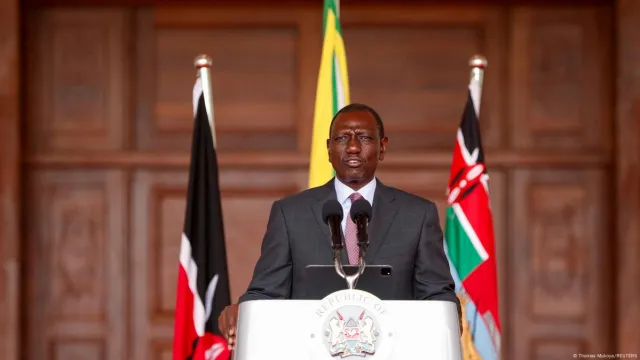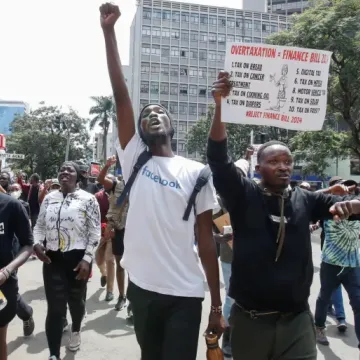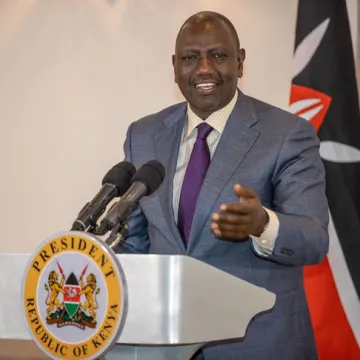Police brutality, abductions plague Kenya's human rights record

In its World Report 2025, Human Rights Watch has singled out cases were senior government officials in Kenya, including President William Ruto's allies threatened to "deal with judges they accused of colluding with petitioners to sabotage the president’s development agenda."
Kenya's global standing on human rights worsened last year as the police excesses meted on protesters, abductions and direct threats to judges persisted in 2024, a new report by Human Rights Watch shows.
According to Human Rights Watch 's World Report 2025, authorities in the country persistently restricted the right to peaceful protest in "heavy handed crackdowns"
On threats to the Judiciary, the rights group singled out incidences where senior government officials, including President William Ruto, who publicly threatened people who filed court petitions challenging Finance Bill 2023 and the Housing Levy. Whereas these two laws were declared unconstitutional by the lower courts, Kenya's Supreme Court reversed the decisions, offering the government the greenlight to tax.
"The authorities failed to address the socio-economic causes of protests and, instead, harassed, intimidated, and arrested protest leaders, activists and civil society groups accused of supporting the protests," the World Report 2025 notes in part.
It adds that President Ruto publicly threatened the courts for making decisions unfavorable to his administration even as authorities went mute on investigations on law enforcement officers who were implicated in widespread human rights abuses.
Police brutality against protesters
On or around June 18, last year, East Africa's largest economy was gripped by youth-led revolt against punitive tax measures contained in the Finance Bill 2024. The proposed law was finally rejected by the president.
These protests continued through August, with protesters irked by what they described as the government's push to meet International Monetary Fund (IMF) revenue targets that would disproportionately fall on people with low incomes.
The protests organized largely by Kenyans between the ages of 18 and 35, popularly known as Gen Z, and hit their peak with the invasion and torching of the Pparliament buildings on June 25.
The protesters revolted against taxes on goods and services such as bread, sanitary towels, and mobile money transfers used by mainly by millions of informal workers, who continue to grapple with thinning incomes and economic hardships.
Between June and August, however, the protesters’ anger ballooned to include runaway government waste, wanton mega corruption and worsening neglect of key public services in the country.
To counter the protests, Human Rights Watch says, "police shot directly into crowds, killing protesters and bystanders."
The Washington-based institution adds that," The authorities have continued to track down people believed to be protest leaders or one of the estimated 3,000 protesters involved in the parliament invasion."
"Several of these people have either been arrested or abducted by suspected security agents then forcefully disappeared. On June 31, a report by the Kenya National Commission on Human Rights (KNCHR) said that police killed at least 60 protesters and abducted another 66 people."
Kenya's poor record on human rights in 2024 continued to worsen as bodies of people showing signs of torture turn up in rivers, forests, quarries, and mortuaries, Human Rights Watch said.
"The authorities have yet to investigate or prosecute anyone for these crimes. Kenya has a history of police brutality and lack of accountability for serious abuses by security forces," Human Rights Watch noted.
Disobedience of court orders
During the period under review, authorities in Kenya dented the country's standing with persistent attacks on judges and outright disobedience of court orders.
In particular, Human Rights Watch singled out cases were senior government officials, including President Ruto's allies threatened to "deal with judges they accused of colluding with petitioners to sabotage the president’s development agenda."
The rights group observed that Dr. Ruto initially ignored court orders halting his administration’s decision to deploy a contingent of 1,000 Kenyan police to quell gangs in Haiti without following due process.
Dr. Ruto later publicly declared that “the courts will not stop me,” and approved the deployment of police to Haiti without addressing all the issues raised by the courts.
Additionally, In August last year, the police ignored a Habeas Corpus suit by the families of three abducted activists—Jamil Longton, Aslam Longton, and Bob Njagi—in which the court found then Acting Inspector General of Police, Gilbert Masengeli, in contempt of court. The authorities responded by withdrawing the judge’s security details.
Threats against civil society
Stung by the nationwide tax revolt against his government, the President publicly accused the Ford Foundation, accusing it of financing the protests. Other civil society groups that faced the wrath of the government during the year were the Kenya Human Rights Commission and Katiba Institute. These two were accused of organizing the countrywide anti-tax protests.
Players in Kenya's media industry were also not spared in the government crackdown, a move that further deteriorated Kenya's human rights record in 2024. In July, Human Rights Watch said, "some media outlets reported that the authorities summoned their editors and threatened them over live coverage of the protests."
"Kenyan media subsequently stopped the live coverage of the protests. President Ruto said he had the power to shut down media over the live coverage of protests but he opted not to do so," the World Report 2025 explains.





